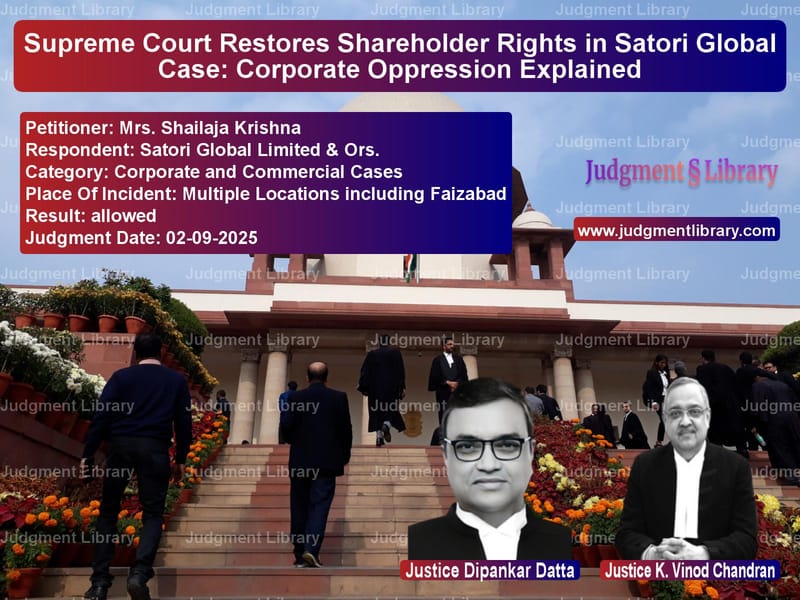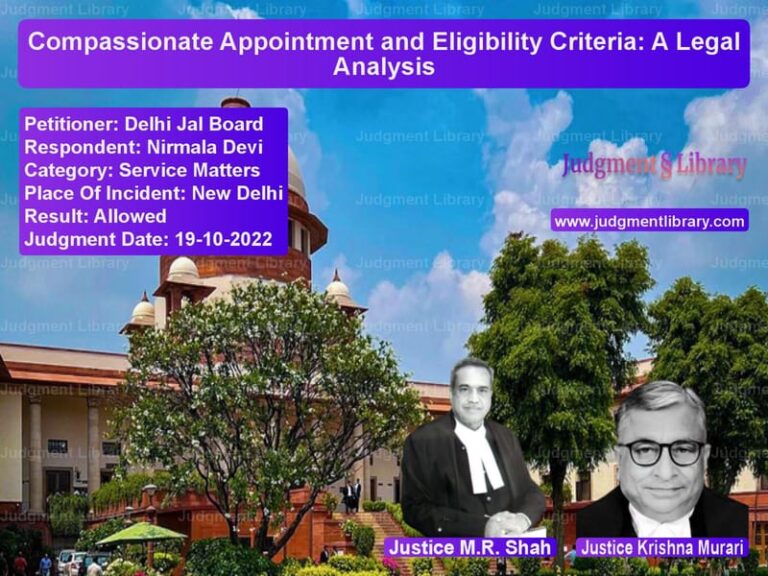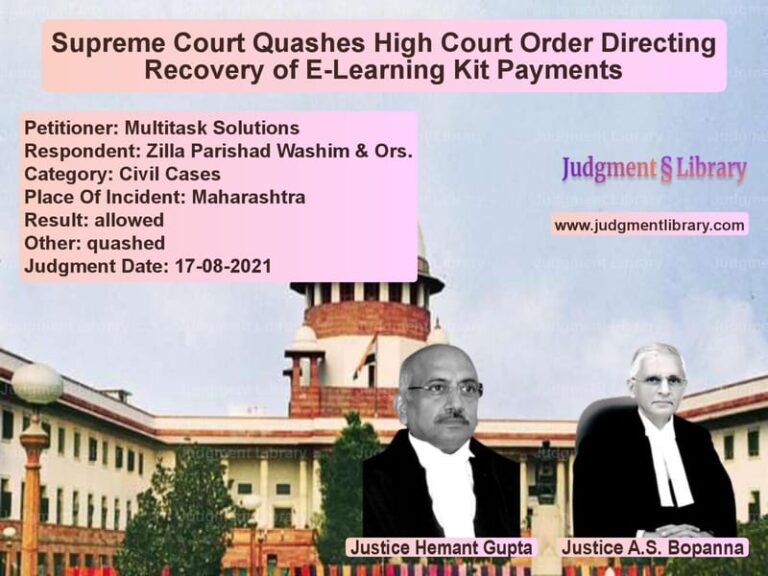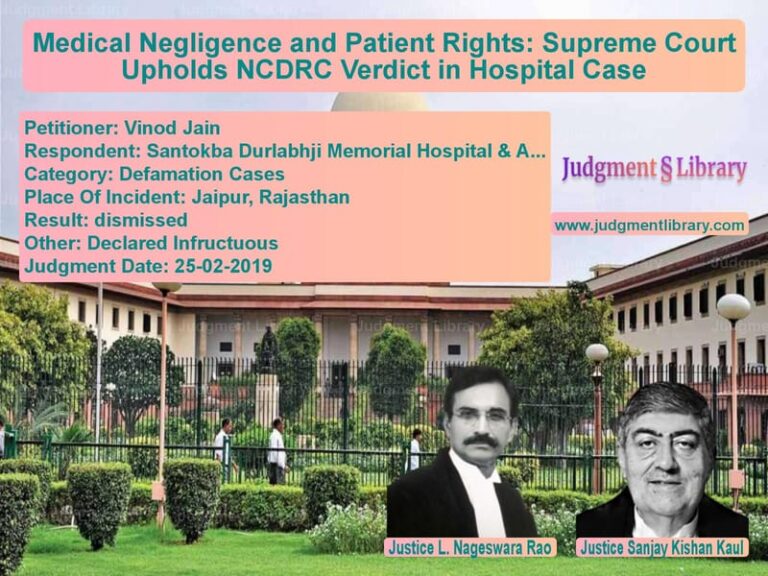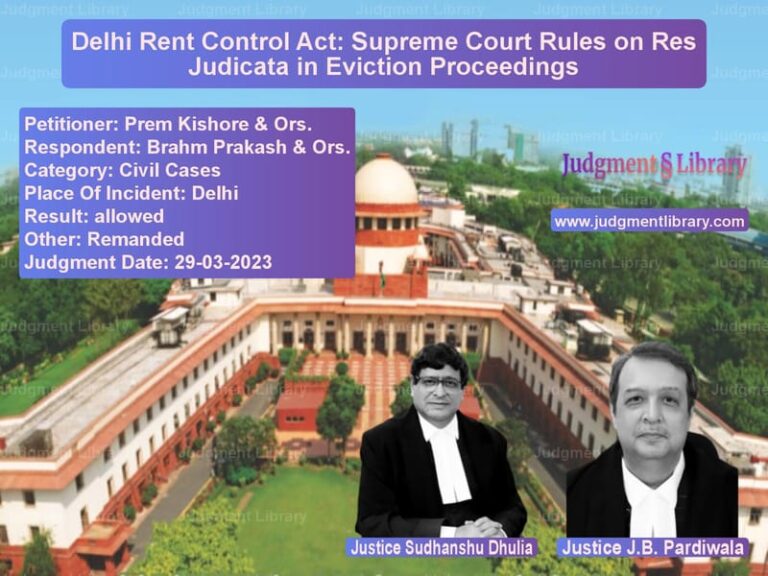Supreme Court Restores Shareholder Rights in Satori Global Case: Corporate Oppression Explained
In a significant corporate law judgment that highlights the vulnerability of minority shareholders in family-run businesses, the Supreme Court of India has restored the rights of a woman shareholder who was systematically ousted from her own company through questionable means. The case of Mrs. Shailaja Krishna versus Satori Global Limited reveals how corporate structures can be manipulated to deprive legitimate shareholders of their rights, and how the legal system can intervene to protect against such oppression.
The legal battle began when Mrs. Shailaja Krishna, one of the original promoters of Satori Global Limited (formerly Sargam Exim Private Limited), found herself completely removed from the company she helped build. What started as a family business venture in 2006 turned into a classic case of corporate oppression when marital discord between Mrs. Krishna and her husband, the second respondent Mr. Ved Krishna, spilled over into the company’s affairs.
Mrs. Krishna initially held 98% of the company’s shares, making her the overwhelming majority shareholder. However, through a series of questionable transactions in December 2010, she lost everything – her directorship, her shares, and her position in the company she had helped establish. The central instrument used in this corporate takeover was a gift deed dated December 17, 2010, through which Mrs. Krishna purportedly transferred her entire shareholding to her mother-in-law, the fourth respondent Mrs. Manjula Jhunjhunwala.
The legal arguments presented by Mrs. Krishna’s counsel, Mr. Dhruv Mehta, were comprehensive and compelling. He argued that the Companies Act, 2013, particularly Section 242, empowers the NCLT to look into acts of oppression and mismanagement even when they involve fraudulent transfer of shares. He emphasized that the affairs of the COMPANY were being conducted in a manner which was oppressive to the Appellant and prejudicial to public interest. Mrs. Krishna had been excluded from participation in management and her name was wrongly removed from the register of members, resulting in her ouster as Director without following due process.
The gift deed itself was challenged on multiple grounds. Mr. Mehta argued that it was invalid in view of Clause 16 read with Clause 2(c) of the Articles of Association. He pointed out that Clause 16 of AoA of the COMPANY allows the transfer of shares of a member by way of a gift to a specific category of persons only, namely ‘Members, Wife, Husband, Son, Daughter-in-law, Son-in-law, Father, Mother, Brother, Sister, Uncle, Nephew, Niece or Cousin’. The transfer in favour of the mother-in-law by way of ‘gift’ was not permitted under the AoA of the COMPANY. Additionally, he contended that the gift deed was obtained under fraud, coercion, and undue influence, with the second respondent having obtained the signatures of the Appellant on blank papers and later forging it.
The board meetings dated December 15, 2010 and December 17, 2010 were also challenged as invalid. Mr. Mehta argued they were conducted in clear violation of the AoA of the COMPANY and the provisions of the 1956 Act. Clause 53 of the AoA stipulates that every board meeting should have a quorum of at least 2 members. However, on the date of the board meeting dated December 15, 2010 the quorum was not complete as the Appellant never attended this meeting. The COMPANY at that point of time had only two directors, the Appellant and the third respondent.
The respondents, represented by Mr. Niranjan Reddy, presented a starkly different narrative. They argued that NCLT fell into manifest error in proceeding to declare the Gift Deed invalid, particularly when serious allegations of fraud, coercion, and forgery were raised. Such questions involve adjudication of complex factual controversies which necessarily require a full-fledged trial involving oral evidence – examination of witnesses and cross-examination – a feature wholly absent from proceedings before the NCLT. The only competent forum to adjudicate upon the validity of the Gift Deed would be a civil court exercising jurisdiction under Sections 31 and 34 of the 1963 Act.
The respondents also contended that the Appellant had no locus standi to institute the company petition under Sections 397 and 398 of the 1956 Act. They argued that the resignation letter submitted by the appellant on December 17, 2010 was valid and effective. Under the 1956 Act, once a director submits a resignation, it takes effect immediately without requiring acceptance by the Board or service of acknowledgment upon the resigning director.
The Supreme Court’s analysis of these competing arguments was thorough and principled. The Court began by examining whether the NCLT had jurisdiction to decide the validity of the gift deed, noting that this was the central question in the case. The Court referenced its earlier decision in Radharamanan v. Chandrasekara Raja, where it held that the CLB would be denuded of the power to provide the diverse reliefs present in the 1956 Act if the Court does not give effect to the wide jurisdiction conferred on the CLB in matters concerning Sections 397 and 398 thereof.
The Court made several crucial observations about the nature of oppression in company law. Quoting from established precedents, the Court noted that oppression would be made out where the conduct is harsh, burdensome and wrong, where the conduct is mala fide and is for a collateral purpose, and where the action is against probity and good conduct. The Court particularly emphasized that the oppressive act complained of may be fully permissible under law but may yet be oppressive. Therefore, the test as to whether an action is oppressive or not is not based on whether it is legally permissible or not since even if legally permissible, if the action is otherwise against probity, good conduct or is burdensome, harsh or wrong or is mala fide or for a collateral purpose, it would amount to oppression.
Applying these principles to the facts of the case, the Court found compelling evidence of oppression. The gift deed was invalid first and foremost since it is against the AoA, specifically clause 16. The clause does not allow a transfer to the mother-in-law and, therefore, the gift deed cannot be called in aid to defeat the claims of the Appellant in the COMPANY. Any action taken which is not permitted by the AoA here cannot be sustained.
The circumstances surrounding the gift deed were also highly questionable. The Court noted that the deed specifically mentions it being purportedly executed by the Appellant to the fourth respondent out of love and affection. However, what paints a divergent image is that the fourth respondent later lodged an FIR alleging that the appellant purportedly committed acts constituting breach of trust qua family jewellery on December 17, 2010, i.e., the very date that the Share Transfer Form was purportedly signed by the Appellant.
The Court also found considerable merit in the Appellant’s argument that the share transfer forms were suspect. A bare perusal of the same discloses that the share transfer form was purportedly signed by the Appellant after the extended period and there is clear overwriting and mismatch of dates on the share transfer form. The Court had no hesitation to hold that the share transfer needs to be set aside on these grounds.
Regarding the board meetings, the Court found they suffered from fundamental illegality and cannot be sustained in law. The same were undoubtedly conducted in violation of the AoA and the 1956 Act. On the issue of notice, clauses 30 and 61 of the AoA read with Section 286 of the 1956 Act, unequivocally mandate that notice of every board meeting must be served on all Directors. The Appellant, who continued as a Director during the relevant period, was never served with notice of either of the meetings dated December 15, 2010 or December 17, 2010.
On the issue of quorum, clause 53 of the AoA mandates that every Board Meeting of the COMPANY must have a quorum of at least two validly appointed Directors. It is an admitted fact that on December 15, 2010, the Appellant was a Director holding 98% shareholding in the COMPANY and the only other Director was the third respondent. Hence, in the absence of the Appellant, the meeting did not have the requisite quorum.
The Supreme Court’s final conclusion was unequivocal: Collectively taken, all these actions of the COMPANY in serial fashion demonstrate clear oppression and mismanagement in its affairs. Probity is lacking which is prejudicial to the appellant. Thus, interference by the NCLAT with the judgment and order of the NCLT, in our opinion, was quite unnecessary. Hence, we set aside the common appellate judgment and order of the NCLAT on the appeals of the respondents and restore that of the NCLT.
This judgment serves as an important reminder that corporate structures cannot be used as instruments of oppression, and that courts will intervene to protect shareholders’ rights when companies are run in a manner that lacks probity and fair dealing. The Supreme Court’s restoration of Mrs. Krishna’s position as director and rightful shareholder reaffirms the principle that corporate might cannot override fundamental rights of ownership and participation in management.
Petitioner Name: Mrs. Shailaja Krishna.Respondent Name: Satori Global Limited & Ors..Judgment By: Justice Dipankar Datta, Justice K. Vinod Chandran.Place Of Incident: Multiple Locations including Faizabad.Judgment Date: 02-09-2025.Result: allowed.
Don’t miss out on the full details! Download the complete judgment in PDF format below and gain valuable insights instantly!
Download Judgment: mrs.-shailaja-krishn-vs-satori-global-limite-supreme-court-of-india-judgment-dated-02-09-2025.pdf
Directly Download Judgment: Directly download this Judgment
See all petitions in Company Law
See all petitions in Corporate Governance
See all petitions in Shareholder Disputes
See all petitions in Corporate Compliance
See all petitions in Fraud and Forgery
See all petitions in Judgment by Dipankar Datta
See all petitions in Judgment by K. Vinod Chandran
See all petitions in allowed
See all petitions in supreme court of India judgments September 2025
See all petitions in 2025 judgments
See all posts in Corporate and Commercial Cases Category
See all allowed petitions in Corporate and Commercial Cases Category
See all Dismissed petitions in Corporate and Commercial Cases Category
See all partially allowed petitions in Corporate and Commercial Cases Category

